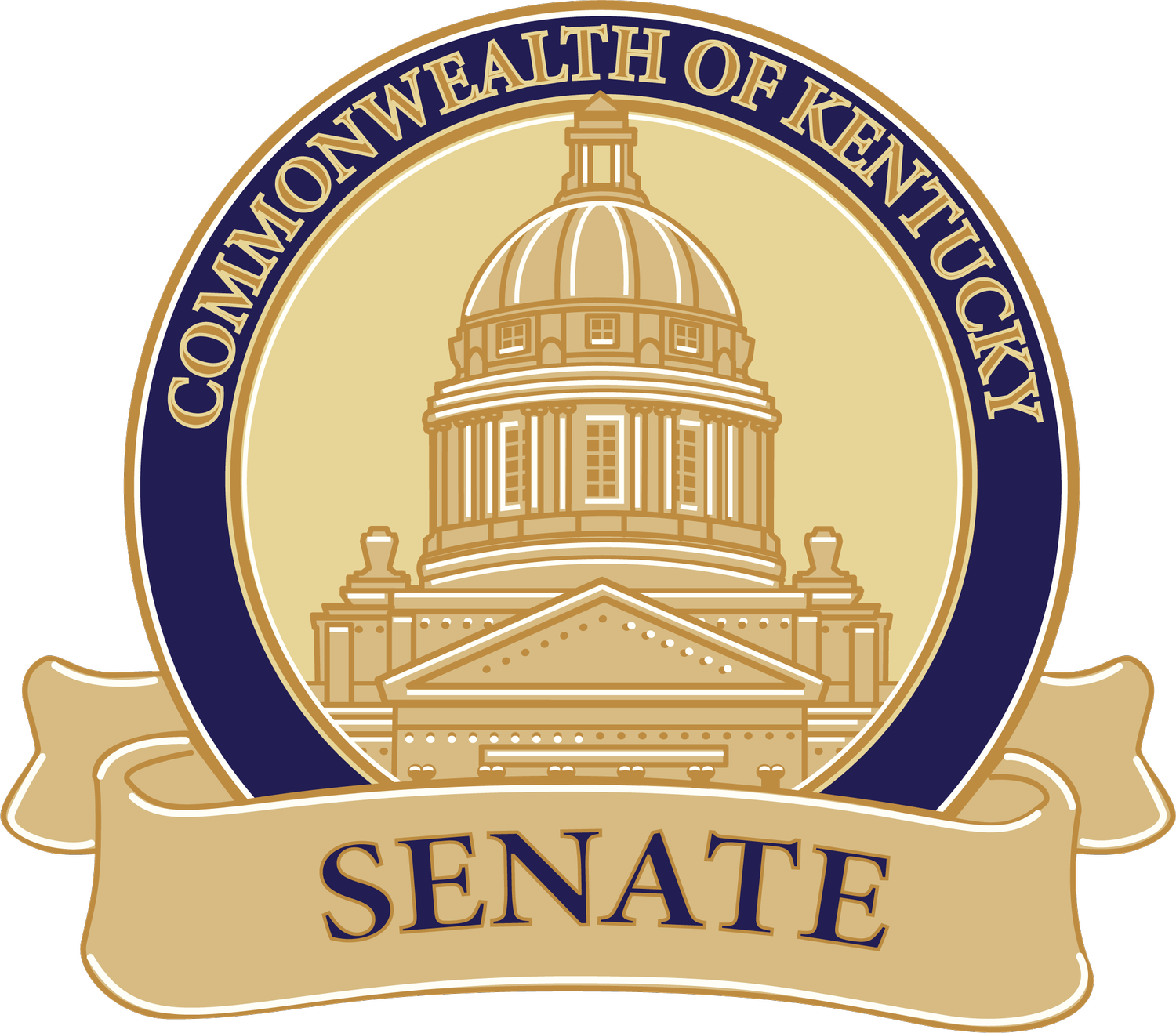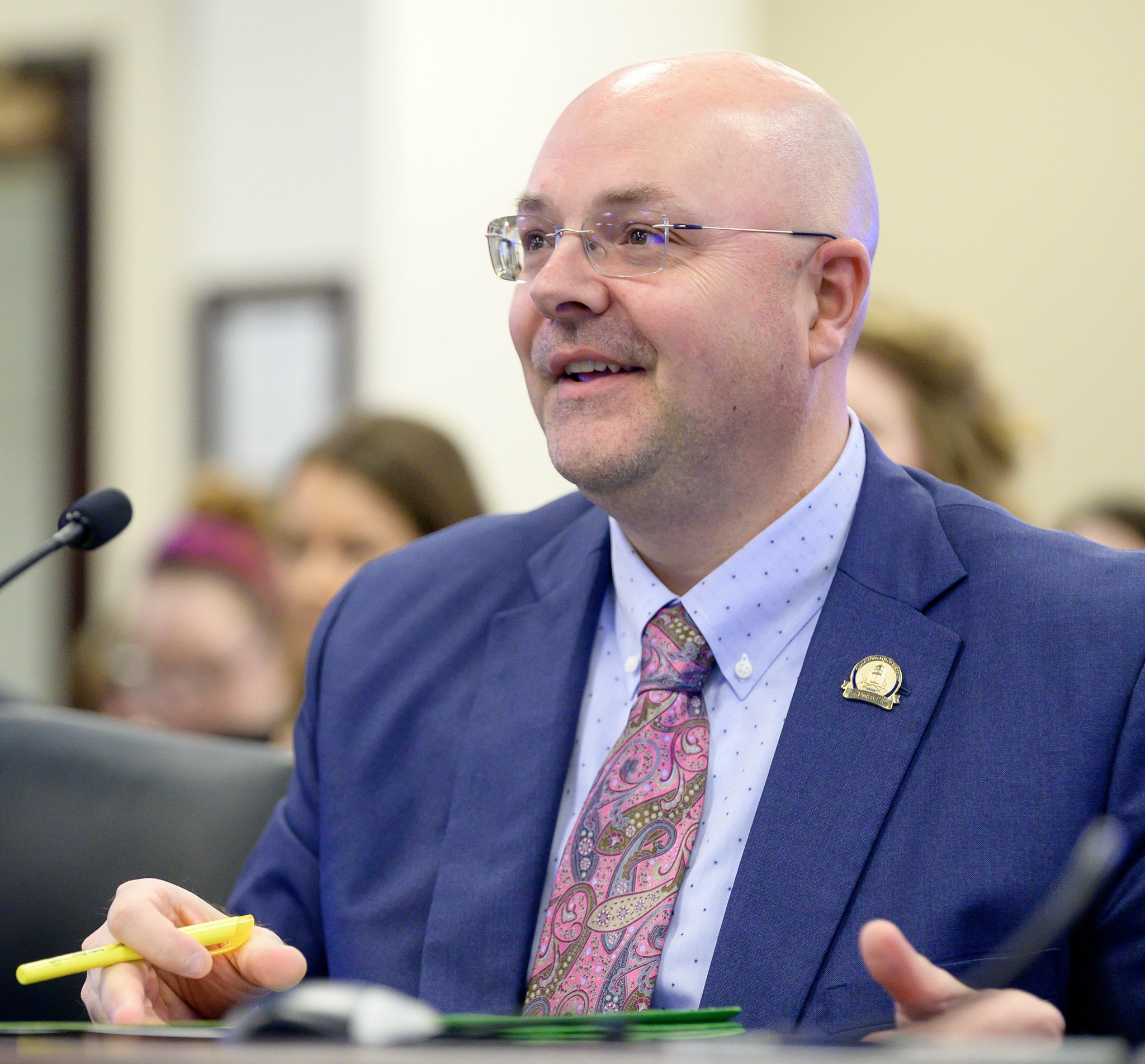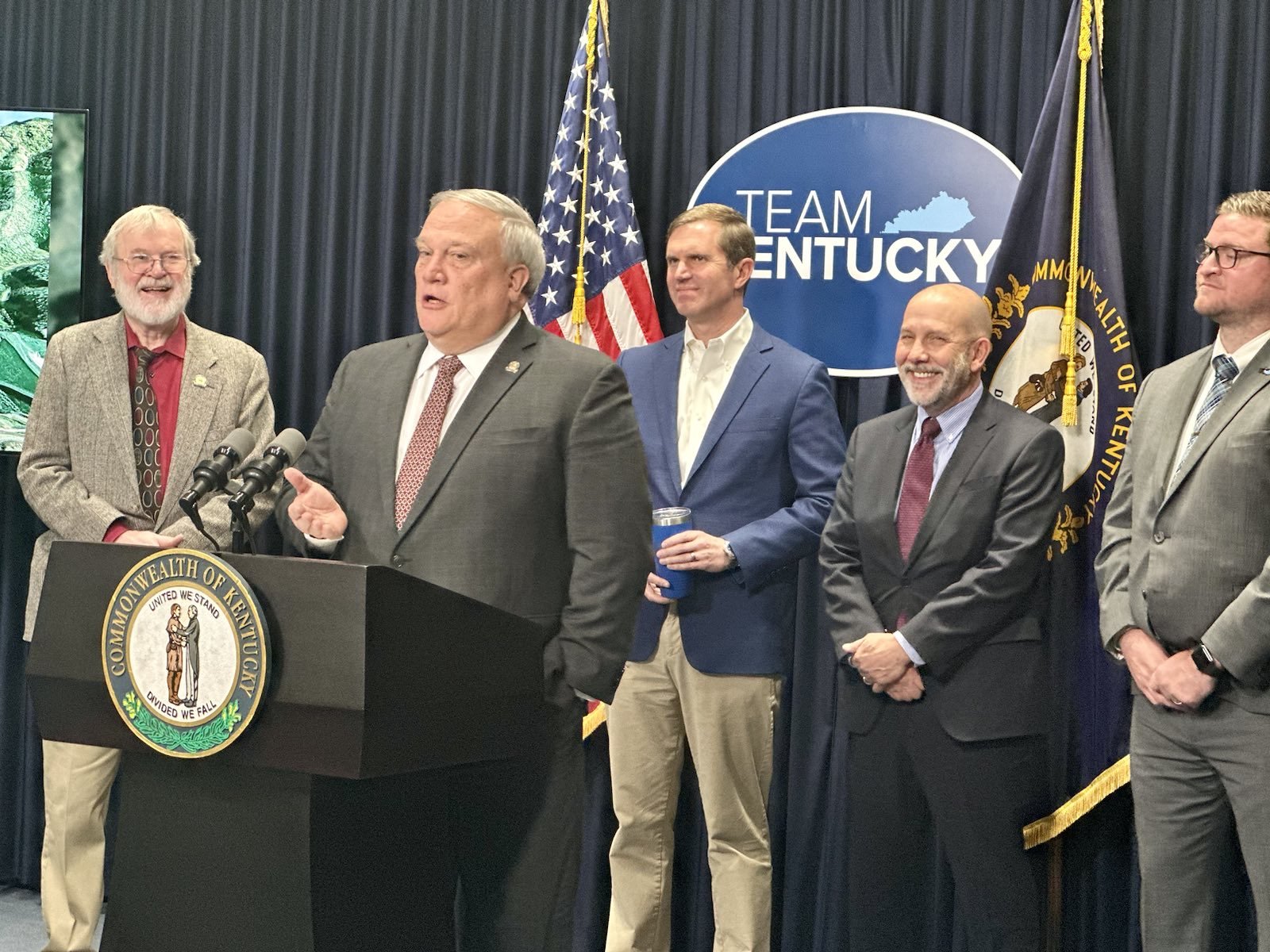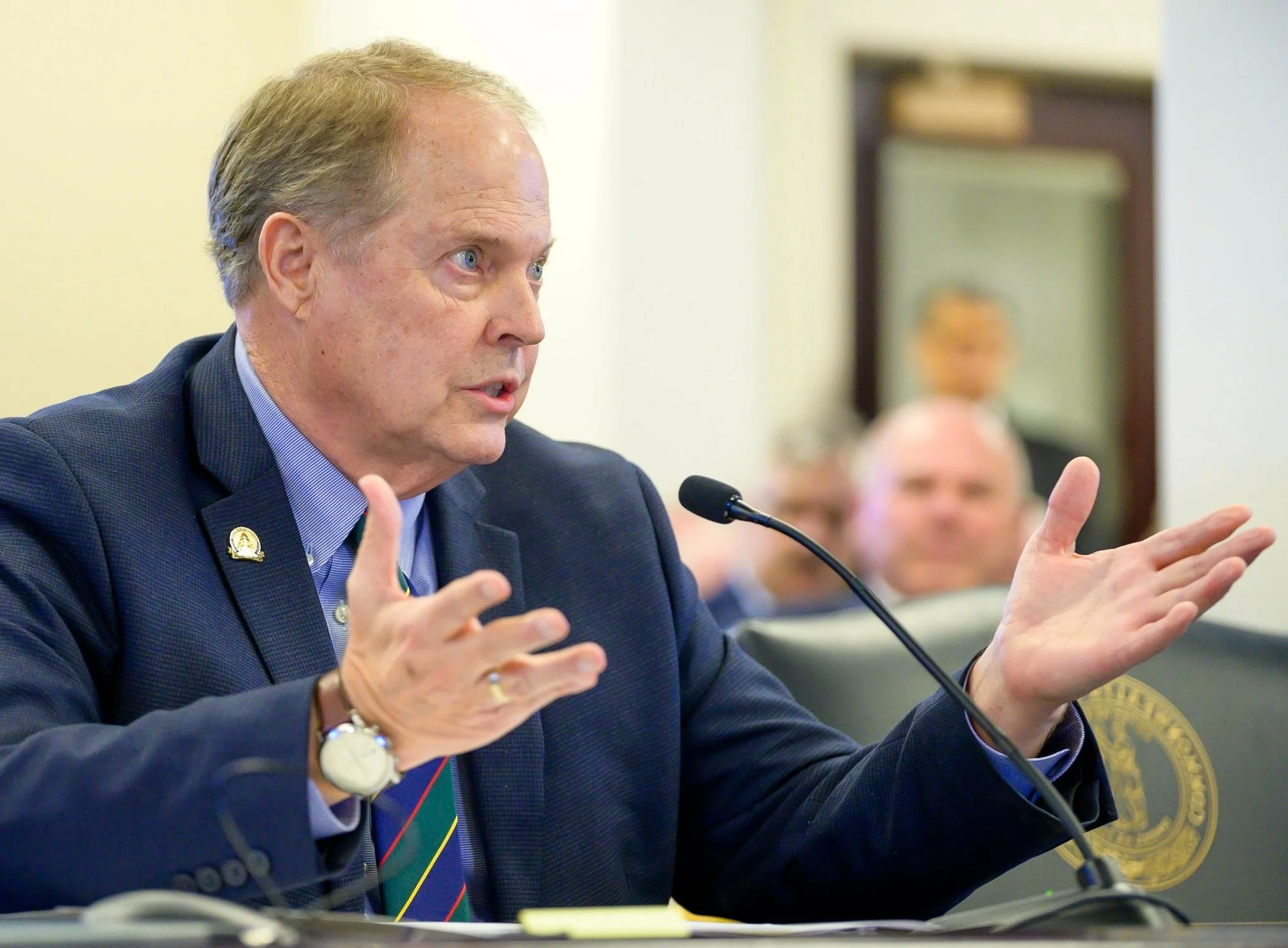FRANKFORT, KY (March 27, 2024)—The Senate adopted Free Conference Committee Report (FCCR) changes to House Bill (HB) 6 on Wednesday. This report reflects additions to the two-year $102 billion biennial budget, which includes general, restricted, and federal funds. The report maintains the conservative supermajorities’ priority to further build on Kentucky’s economic momentum, strengthen communities in all regions, and improve the lives of Kentucky’s families and children.
Senate Budget Chair Chris McDaniel, R-Ryland Heights, and legislative leaders prioritized further reducing working Kentuckians' income taxes. As of January 1, the income tax rate stands at 4 percent. By December 2024, these reductions championed by the legislature will have left $1.8 billion in the pockets of working Kentuckians.
Crafted with careful deliberation and countless hours of discussion, the General Assembly’s negotiated FCCR emphasizes education, school facilities, teachers, postsecondary education, juvenile justice, corrections, safety, law enforcement, health and families, Medicaid, and energy. Budget highlights below reflect additional funding over and above the currently enacted budget and supplemental appropriation bills:
EDUCATION
STUDENTS AND TEACHERS - K-12
● Increases the SEEK per-pupil base guarantee to $4,326 in fiscal year (FY) 25 (3 percent increase from FY 24 base amount of $4,200) and to $4,586 in FY 26 (6 percent increase from FY 25 amount of $4,326).
● Increases the Tier I threshold from 15 percent to 17.5 percent.
● Increases general fund by $9.7 million in FY 25 and $19.4 million in FY 26 to provide the full statutory on-behalf payments to the Teachers’ Retirement System for districts.
● Increases general fund by $5.6 million in FY 25 and $5.1 million in FY 26 to equalize all previously authorized recallable nickels at 100 percent and new recallable nickels at 25 percent.
● Increases general fund by $44.6 million in FY 25 and $65.9 million in FY 26 to support
● Increases to 90 percent and 100 percent funding levels, respectively, of FY 23 final calculated costs for pupil transportation funding.
● Increases general fund by $5 million in FY 26 for the Star Academy three-year pilot program of five charter schools.[1]
● Increases general fund by $4 million each FY for the operations of additional family resource centers currently serving more than one school.
● Increases general fund by $241,300 each FY for the Governor’s Scholars Program.
● Increases general fund by $105,000 each FY for the Governor’s School for Entrepreneurs.
Teachers Retirement System
● Directs the use of $11 million excess state funding for retiree health insurance in FY 25 and increases the general fund by $6.5 million in FY 26 to continue covering the cost of single coverage for members who have retired since July 1, 2010, but are not yet eligible for Medicare.
● Increases general fund support by $159.2 million in FY 25 and $302.1 million in FY 26 and directs the use of $29.3 million of FY 23 lapses to continue paying the full actuarially determined contribution in each FY.
School Safety
● Increases general fund by $2 million each FY to support the Center on School Safety.
● Increases general fund by $16.5 million in FY 25 and $18 million in FY 26 for school resource officers on a reimbursement basis of up to $20,000 per campus to be administered by the Kentucky Department of Education.
Learning and Support Services
● Increases general fund by $93.7 million in FY 25 and $227.6 million in FY 26 for the state’s on-behalf payment for school district health insurance.
School Facility Construction and Improvements
● Amends language to identify six schools that previously received special offers of assistance in FY 23 for additional special offers via bond authorization in FY 25 to support 100 percent of the gap reported to the Kentucky Department of Education caused by construction cost inflation.
● Adds language outlining the Secondary Area Technology Center Renovation Grant Pool in FY 26 with criteria and $7.5 million per award cap.
● Adds language outlining the School Facility Assistance Fund in FY 26 to support awards of up to 50 percent of the gap certified by the audit as outlined in the Auditor of Public Accounts and subject to approval by the General Assembly.
POSTSECONDARY EDUCATION
Lottery funds supporting student scholarships
● Increases general fund by $9.2 million each FY for the Work Ready Kentucky Scholarship Program.
● Increases general fund by $23.2 million in FY 25 and $39.8 million in FY 26 for the College Access Program.
● Increases restricted funds by $79.3 million in FY 25 and $69.6 million in FY 26 for the College Access Program.
● Increases restricted funds by $21.9 million in FY 25 and $19.3 million in FY 26 for KEES.
● Increases general fund by $141,400 in FY 26 for Veterinary Medicine Contract Spaces.
● Increases general fund by $1 million and Restricted Funds by $300,000 each FY for the Teacher Scholarship Program.
● Increase the general fund by $5 million annually for the Innovative Scholarship Pilot Project.
● Increases general fund by $1.1 million for the Kentucky Rural Veterinarian Loan Repayment Program.
State Universities and Institutions
● Increases general fund by $7.7 million in FY 25 and $17.7 million in FY 26 to invest in postsecondary educational institutions through the performance-based funding model.
● Increases general fund by $2 million in FY 24 to study expanding post-baccalaureate program offerings at comprehensive universities.
● Increases general fund by $750,000 in FY 25 for Kentucky State University oversight.[2]
● Increases general fund of $281.5 million each fiscal year to establish an asset preservation pool for each postsecondary institution.
INFRASTRUCTURE - DRINKING WATER, WASTEWATER AND BROADBAND EXPANSION
● Increases federal funds by $30.8 million in FY 25 and $25.3 million in FY 26 to expand the Clean Water State Revolving Fund.
● Increases federal funds by $84.7 million in FY 25 and $41.1 million in FY 26 to expand the Drinking Water State Revolving Fund.
● Increases federal funds by $217.2 million in FY 25 and $868.9 million in FY 26 for broadband deployment as part of the federal Broadband Equity Access and Deployment Program (BEAD).
ECONOMY AND WORKFORCE
State Employees
● Each fiscal year includes annual salary increments of 3 percent to state employees.
● Includes general fund in the amount of $250 million each fiscal year to pay down the unfunded pension liability of the KY Employees Retirement System Nonhazardous plan.
Regional and Locality Focus
· Increases general fund by $4 million in FY 24 to provide a match for a federal grant to support the Economic Development Administration Recompete Pilot Program, which benefits 12 persistent poverty counties in southeastern Kentucky.
● Senate language included requires a salary compensation report, which must include emphasis on the issue of compression and a review of all other types of salary increases and practices that have been utilized by the executive branch to increase the salary of employees, including locality pay
Healthcare Worker Shortage
● Increases general fund by $7 million in FY 25 and $3 million in FY 26 for the Kentucky Healthcare Workforce Investment Fund.
Area Technology Centers
● Increases general fund by $175,000 in FY 25 and $225,000 in FY 26 for increased salaries at state area technology centers.
VETERANS, MILITARY LAW ENFORCEMENT AND PUBLIC SAFETY
Supporting Veterans
● Increases general fund by $12.4 million in FY 25 and $5.6 million in FY 26 and increases restricted funds by $10 million in FY 26 for personnel and operating costs associated with opening the Bowling Green Veterans Center.
● Allocates approximately $30 million across the biennium to support the operations of Veterans Centers and increased operating costs.
● Increases General Fund by $320,000 in each fiscal year to provide additional burial costs for National Guard and Reserve veterans ineligible for federal benefits.
● Increases Restricted Funds by $1.6 million in FY 24, $11.4 million in FY 25, and $18.4 million in FY 26 for increased veterans center salary and operating increase.
● Increases General Fund by $76,000 in FY 25 and $152,000 in FY 26 to increase grant amounts to Veterans Service Organizations Burial Guard.
State Police
● Increases general fund by $8.3 million in FY 25 and $14.2 million in FY 26 to support the statutory CPI adjustment, in both years, in the trooper salary schedule for 1,013 troopers and commercial vehicle enforcement officers.
● Increases general fund by $6 million in FY 25 and $16.6 million in FY 26 to support classes of 75 trooper cadets each FY.
● Increases general fund by $2.6 million in FY 26 to support the purchase of an additional 50 marked cruisers and 50 unmarked cruisers each year.
Volunteer Fire Departments
● Increases restricted funds by $3.7 million in FY 25 and $4.4 million in FY 26 to support an increase to incentive payments of 3 percent in FY 25 and 3 percent in FY 26 for each qualified professional firefighter under the Firefighters Foundation Program Fund and to increase aid payments for each volunteer fire department to $15,000 each fiscal year.
● Provides for $16.8 million in restricted funds to be transferred in FY 25 to support Kentucky Fire Commission capital projects.
Criminal Justice Training
● Includes sufficient restricted funds funding to provide for a 3 percent increase to the incentive payment each fiscal year and expands eligibility to part-time law enforcement officers
● Increases restricted funds by $1.3 million in FY 25 and $2.2 million in FY 26 to support additional positions including 20 law enforcement instructors.
● Increases restricted funds by $1 million in FY 25 and $1.1 million in FY 26 to provide necessary transfer authority for other additional budget requests to adhere to overall KLEFPF decisions, including an increase in the number of post-critical incident seminars and officer revocation hearing process expenses.
● Increases restricted funds by $5 million in FY 25 and $10 million in FY 26 to support the transfer of funds to the attorney general to purchase body armor.
● Increases the Kentucky Law Enforcement Foundation Program Fund training incentive stipend for each full-time eligible participant to $4,429 in FY 25 and $4,562 in FY 26 and includes part-time at half that amount each year, respectively.
Military Affairs
● Increases general fund by $1.8 million each fiscal year to provide the state match requirement for the two National Guard Youth Challenge programs.
● Increases general fund by $8.3 million in FY 25 and $7.8 million in FY 26 to fund the Kentucky Urban Search and Rescue Team as part of the Department of Emergency Management.
Homeland Security
● Increases restricted funds by $1.1 million every fiscal year (including FY 24) to meet contractual obligations for Commercial Mobile Radio Services (CMRS).
● Increases the general fund by $5 million each fiscal year to complete the statewide deployment of next-generation 911 services as part of CMRS.
Juvenile Justice
● Increases general fund by $20 million in FY 26 to support a medical services contract for primary care and mental health care across all facilities.
● Increases general fund by $3.9 million each fiscal year to support alternative detention programming and contract increases.
● Increases general fund by $3.5 million each fiscal year to support additional positions, screening tools, and training to implement evidence-based programming.
● Adds language requiring a report on the design and cost parameters of the Renovate Louisville Detention Center capital project.
● Adds language requiring a report on the design and cost parameters for a high-acuity juvenile mental health treatment facility.
Corrections
● Increases general fund by $9.8 million in FY 25 and $19.8 million in FY 26 to support the staffing, medical care, education services, addiction services, and reentry efforts stemming from the expansion of Little Sandy Correctional Complex.
● Increases general fund by $14.8 million in FY 25 and $16.1 million in FY 26 to support medical, mental health, and utility costs.
● Increases general fund by $307,400 in FY 25 and $2 million in FY 26 and restricted funds by $2 million each FY to support an additional 20 probation and parole officer positions and operating costs.
Department of Public Advocacy
● Increases general fund by $11 million in FY 25 and $11.4 million in FY 26 to support additional positions and operating costs associated with state assumption of the Jefferson County Public Defender’s Office.
LOCAL GOVERNMENT
County Jails
● Increases general fund by $12 million each fiscal year to continue a county jail incentive program.
● Adds language to require the DOC to conduct a study in conjunction with county jails to determine the cost of housing certain pretrial defendants in a state prison after an initial 60 days of being housed in a county jail.
Department for Local Government
● Increases federal funds by $226.6 million in FY 25 and $180.5 million in FY 26 to take advantage of increased federal funding for various grant programs.
● Increases restricted funds by $1.25 million in FY 25 and $750,000 in FY 26 for a one-time addition to the Kentucky Mountain Regional Recreation Authority appropriation of $1.75 million in FY 25 and $1.25 million in FY 26.
County Attorneys
● Increases general fund by $8.3 million in FY 25 and $9.3 million in FY 26 to support the County Attorney’s 2020 Salary Classification Report.
● Increases general fund by $3.5 million each fiscal year for additional positions for county attorneys.
Commonwealth’s Attorneys
● Increases general fund by $2.5 million each fiscal year for additional positions for commonwealth’s attorneys.
SUPPORTING ESSENTIAL GOVERNMENT SERVICES
Community-Based Services
● Increases general fund by $2 million each fiscal year to support the operations of the domestic violence shelters.
● Amends language to clarify funding directed to support operational costs of the children’s advocacy centers, the domestic violence shelters, and the rape crisis centers.
● Amends language for the Jefferson County Family Recovery Court to specify Seven County Services as the provider.
● Increases general fund by $775,000 each fiscal year as one-time funding to support facility improvements at Maryhurst.
● Increases restricted funds by $10.6 million and federal funds by $2.4 million each fiscal year to provide a rate equity increase to the DCBS foster care homes.
● Increases general fund by $17.9 million in one-time funding in FY 25 to offset a reduction in federal funds from the Victims of Crime Act that support the children’s advocacy centers, the domestic violence shelters, and the rape crisis centers.
● Increases general fund by $2.5 million each fiscal year to support the Early Childhood Development Scholarship Program.
Senior Citizens
● Increases the general fund by $10 million each fiscal year to expand the senior meal program.
● Increases general fund by $1.1 million and restricted funds by $394,300 each fiscal year to support staffing and operations for the Office of Dementia Services and the State Long-Term Care Ombudsman.
Medicaid Benefits
● Increases general fund by $142.8 million, restricted funds by $400,000, and federal funds by $583.6 million in FY 25 and increases general fund by $151.2 million, restricted funds by $400,000, and federal funds by $616.2 million in FY 26 for continuation of KCHIP services.
● Increases general fund by $3.6 million and federal funds by $9.1 million in FY 25 for 250 additional Michelle P. waiver slots and increases general fund by $10.9 million and federal funds by $27.4 million in FY 26 for 500 additional Michelle P. waiver slots.
● Increases federal funds by $1.1 billion in FY 24, increases restricted funds by $123.4 million and federal funds by $1.1 billion in FY 25, and increases general fund by $394.5 million and federal Funds by $1.7 billion in FY 26 for Medicaid benefits growth.
● Increases general fund by $3.7 million and federal funds by $9.3 million in FY 25 for 125 additional Supports for Community Living (SCL) waiver slots and increases general fund by $11.1 million and federal funds by $28 million in FY 26 for 250 additional SCL waiver slots.
● Increases general fund by $2.4 million and federal funds by $6.1 million in FY 25 for 250 additional Home and Community-Based Services (HCBS) waiver slots and increases general fund by $7.2 million and federal funds by $18.2 million in FY 26 for 500 additional HCBS waiver slots.
● Increases general fund by $729,800 and federal funds by $1.8 million in FY 25 for 25 additional Acquired Brain Injury-Long Term Care (ABI-LTC) waiver slots and increases general fund by $1.5 million and federal funds by $3.7 million in FY 26 for 25 additional ABI-LTC waiver slots.
● Increases restricted funds by $4.3 million and federal funds by $10.8 million in FY 25 and increases restricted funds by $4.6 million and federal funds by $11.6 million in FY 26 for implementation of a waiver to provide services to individuals with serious mental illness.
● Increases restricted funds by $11.3 million and federal funds by $28.6 million in FY 25 and increases restricted funds by $13 million and federal funds by $32.7 million in FY 26 for implementation of a waiver to provide services to individuals with substance use disorder.
● Increases general fund by $3.8 million each fiscal year to support the monthly personal needs allowance increase from $40 to $60.
● Increases general fund by $25 million in FY 26 to support a rebasing of Medicaid reimbursement rates contingent on approval by the General Assembly of a comprehensive proposal to be developed and presented to the Interim Joint Committee on Appropriations and Revenue by December 1.
Behavioral Health, Developmental and Intellectual Disabilities
● Increases general fund by $2.5 million in FY 25 and $3 million in FY 26 for statewide expansion of the Tim’s Law pilot program.
Public Health
● Increases general fund by $2.5 million annually for pediatric cancer research.
● Increases general fund by $953,400 in FY 25 and $1 million in FY 26 for staffing and operations for local health departments.
ADDITIONAL SUPPORT FOR FAMILIES AND CHILDREN
Child Care
● Increases general fund by $21 million and federal funds by $7 million in FY 25 and general fund by $28 million in FY 26 to maintain reimbursements to child care providers for Child Care Assistance Program families at the 80th percentile of the market rate survey.
● Increases general fund by $12.8 million and federal funds by $5 million in FY 25 and general fund by $18.5 million and federal funds by $1.3 million in FY 26 to support CCAP initiatives including an income exclusion for eligibility determinations for child care providers; a six-month transition for families no longer eligible for CCAP benefits; background check fees covered for child care providers; and establishment of an Innovations in Early Childhood Education Delivery Grant Program.
Foster and Fictive Kin Care
● Increases general fund by $3 million, restricted funds by $2 million, and federal funds by $3 million in FY 25, and increases general fund by $6 million, restricted funds by $2 million, and federal funds by $3 million in FY 26 for a relative caregiver reimbursement rate increase.
● Increases restricted funds by $10.6 million and federal funds by $2.4 million each fiscal year to provide a rate equity increase to the Department of Community Based Services foster care homes.
Drug Epidemic
● Provides $500,000 each fiscal year to Volunteers of America - Family Recovery Court to support operations.
Mental Health and Intellectual Disabilities
● Provides a one-time allocation of $6.5 million each fiscal year to support infrastructure modernization programs for Holly Hill Child and Family Solutions.
● Provides one-time funding of $2.2 million each fiscal year to support the LifeWorks at Western Kentucky University Program.
ENERGY
● Increases general fund by $1.8 million in FY 25 and $1.2 million in FY 26 to support additional personnel and operating costs associated with the analysis and regulation of per- and polyfluoroalkyl substances.
● Increases general fund by $835,500 in FY 24 and $832,400 each fiscal year to support the matching requirement for the federal Grid Resilience Grant Programs.
● Increases federal funds by $5.5 million each fiscal year to support the federal Grid Resilience Grant Program.
TOURISM AND SIGNATURE INDUSTRIES
● Allows more financial flexibility within the Kentucky Department of Fish and Wildlife by increasing peace officers' training stipend ($38,000 in FY 25 and $76,000 in FY 26) and supporting conservation camps ($250,000 each fiscal year).
● Increases general fund by $2,050,000 in FY 26 for Kentucky Exposition Center equipment replacement.
COMMUNICATION AND COLLABORATION WITH STATEWIDE OFFICEHOLDERS
Kentucky Attorney General
● Increases general fund by $450,000 each fiscal year to support the Child Exploitation Specialized Investigation and Prosecution Unit to combat child exploitation and human trafficking.
● Increases general fund by $41,500 in FY 24 and $140,900 each fiscal year to support the Kentucky Office of Regulatory Relief.
● Increases general fund by $691,700 in FY 24 and $1,011,700 each year of the 2024-2026 fiscal biennium for general fund replacement for Medicaid match for the Office of Medicaid Fraud and Abuse Control and adds a reporting requirement.
● Increases restricted funds by $5 million in FY 25 and $10 million in FY 26 to support the Body Armor Grant Program.
Kentucky Department of Agriculture
● Increases tobacco fund support for the Rural Mental Health, Suicide Prevention, and Farm Safety Program by $500,000 each fiscal year Y, placing the program solely under the Department of Agriculture.
● Increases tobacco fund support for the Farms to Food Banks program by $250,000 in FY 25 and $400,000 in FY 26.
● Appropriates tobacco fund monies in the amount of $150,000 in FY 25 to create a Comprehensive Agricultural Plan.
● Increases general fund support to county fair grants by $295,000 each fiscal year.
● Adds language requiring coordination between the Commissioner of Agriculture and the Secretary of the Cabinet for Economic Development on agriculture-related development projects.
Kentucky Secretary of State
● Increases general fund by $145,600 for an additional senior software engineer contract each fiscal year.
● Increases general fund by $5,600 in FY 25 for presidential elector per diem.
● Increases general fund by $1,400 each fiscal year for additional operating costs of the Registry of Election Finance.
Kentucky State Treasurer
● Increases general fund by $120,000 in FY 25 for printing equipment and better constituent service operations
Kentucky Auditor of Public Accounts.
● Increases general fund by $2,250,000 and restricted funds by $16,042,400 each fiscal year to support the transition of the CHFS Office of the Ombudsman and Administrative Review to the Auditor of Public Accounts on July 1, 2024, as enacted in 2023 Senate Bill 48.
The complete language of HB 6 with FCCR can be found a little later at Legislature.ky.gov.
# # #
Please visit Legislature.ky.gov for more information on Senate Majority Caucus members and the 2024 Legislative Session, such as committee schedules, membership, legislation, and more.




















